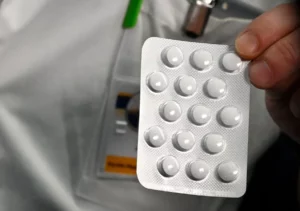Are you constantly checking things over and over, or stuck with thoughts that just won’t go away? If these relentless obsessions and compulsions sound familiar, you’re not alone. Extreme or Severe OCD can be overwhelming, but there’s hope. In our blog, we’re going to talk about ‘Treatment Options To Deal With Extreme OCD.’
We’ll explore various approaches like Cognitive Behavioral Therapy, effective medications, and lifestyle changes that can make a difference. So, join us to discover how you can regain control and start living life more freely.
Contents
Understanding Extreme OCD
 Extreme or severe Obsessive-Compulsive Disorder (OCD) goes beyond the occasional worries or habits that many people experience. Here’s what sets it apart:
Extreme or severe Obsessive-Compulsive Disorder (OCD) goes beyond the occasional worries or habits that many people experience. Here’s what sets it apart:
- In extreme OCD, the obsessions (intrusive, unwanted thoughts) and compulsions (behaviors performed to relieve these thoughts) are more intense. They’re not just bothersome; they’re overpowering and can dominate a person’s daily life.
- These symptoms are so strong that they can cause significant distress and anxiety.
Unlike milder forms of OCD where compulsions may occur occasionally, in severe cases, these behaviors can be constant and very time-consuming, often lasting for hours each day. The obsessions are also more frequent, persistent, and harder to dismiss or control.
Impact on Daily Functioning
- Extreme OCD can severely disrupt day-to-day activities. It can affect work, relationships, and social activities.
- The compulsive behaviors in severe cases are not just rituals; they’re necessities that the person feels compelled to perform, despite any rational understanding of their irrationality.
- Emotional Toll:
- The emotional impact of severe OCD is substantial. It often leads to feelings of shame, and isolation, and in some cases, can contribute to depression.
- The constant battle with intrusive thoughts and the need to perform compulsions can be exhausting and overwhelming.
Understanding the severity and impact of extreme OCD is crucial in recognizing the need for specialized treatment and support. It’s a condition that requires a comprehensive approach for management and relief.
What are the Worst Symptoms of OCD?
 When it comes to Obsessive-Compulsive Disorder (OCD), some symptoms can be particularly severe and debilitating. Here are a few worst-case scenarios often associated with extreme OCD:
When it comes to Obsessive-Compulsive Disorder (OCD), some symptoms can be particularly severe and debilitating. Here are a few worst-case scenarios often associated with extreme OCD:
- The most distressing aspect can be the nature of the intrusive thoughts, which often revolve around harm, sexual content, or religious blasphemy. These thoughts can be deeply disturbing, causing immense anxiety and guilt.
- Severe OCD can lead to compulsions that are time-consuming and significantly interfere with daily life. For instance, someone might spend hours each day washing their hands or checking locks, leading to skin damage or significant disruptions in daily routines.
- To prevent triggering their obsessions, individuals with severe OCD might avoid certain places, people, or activities. This can lead to isolation and can severely limit their ability to function normally in social, work, or family settings.
- Not all compulsions are physical. Mental rituals, such as having to count to a certain number or repeat specific words or prayers silently, can be mentally exhausting and interfere with the ability to think or concentrate on other tasks.
- The anxiety and compulsive behaviors can significantly disrupt sleep patterns, leading to chronic fatigue and impacting overall health and well-being.
- One of the worst fears for someone with OCD is the worry that they might act on their intrusive thoughts, despite these thoughts being at odds with their actual values and character.
- The constant battle with OCD symptoms can lead to feelings of hopelessness and depression, making it a dual challenge to cope with both disorders.
Recognizing these severe symptoms is key to understanding the impact of OCD and the importance of seeking effective treatment. If you or someone you know is experiencing these symptoms, it’s crucial to consult a mental health professional for support and guidance.
Can Extreme OCD Be Cured?
When it comes to extreme OCD, it’s important to understand the nature of the condition in terms of treatment and management. As of now, there’s no permanent cure for OCD, but there are effective treatment options that can significantly help in controlling the symptoms
Many individuals with OCD are able to achieve significant relief from their symptoms through a combination of therapy, medication, and lifestyle changes. In the following sections, we’ll explore these treatment options in detail, offering hope and practical solutions for those dealing with extreme OCD. Stay tuned…
Treatment Available To Deal With Extreme or Severe OCD

Dealing with extreme or severe OCD requires a comprehensive approach to treatment. Here are some of the effective treatments available:
Psychotherapy
 In treating extreme OCD, psychotherapy plays a pivotal role, with certain therapy techniques being particularly effective. The two most prominent are Cognitive Behavioral Therapy (CBT) and Exposure and Response Prevention (ERP) therapy:
In treating extreme OCD, psychotherapy plays a pivotal role, with certain therapy techniques being particularly effective. The two most prominent are Cognitive Behavioral Therapy (CBT) and Exposure and Response Prevention (ERP) therapy:
- Cognitive Behavioral Therapy (CBT):
- How It Works: CBT for OCD involves changing the negative thought patterns that fuel obsessions and compulsions. It teaches individuals to challenge and alter these thoughts, thereby reducing the anxiety and distress they cause.
- Process: In CBT, therapists help individuals identify and understand their intrusive thoughts and then develop healthier and more realistic ways of interpreting them. This process often involves learning to confront these thoughts without resorting to compulsive behaviors.
- Exposure and Response Prevention (ERP) Therapy:
- Core Technique: ERP is considered the first-line treatment for severe OCD and is often integrated within CBT.
- How It Works: In ERP, individuals are gradually exposed to situations or objects that trigger their OCD while being coached or trained to not engage in compulsive behaviors. For instance, someone with a contamination fear might touch a doorknob and then resist the urge to wash their hands.
- Goal: The aim is to desensitize the individual to their triggers and teach them that anxiety or discomfort decreases over time, even without performing the compulsion.
Both CBT and ERP are effective in putting the symptoms of severe OCD into remission. The skills learned in these therapies are also useful in preventing relapse, making them a crucial part of long-term management of OCD.
Medications To Deal with Extreme OCD
 Medication can play a significant role in the treatment of extreme OCD, particularly when used in conjunction with psychotherapy. Here are some of the common types of medications prescribed:
Medication can play a significant role in the treatment of extreme OCD, particularly when used in conjunction with psychotherapy. Here are some of the common types of medications prescribed:
- Selective Serotonin Reuptake Inhibitors (SSRIs):
- SSRIs are often the first choice of medication for treating OCD.
- Examples include fluoxetine (Prozac), sertraline (Zoloft), and paroxetine (Paxil).
- They work by increasing the levels of serotonin in the brain, which can help reduce the symptoms of OCD.
- Serotonin-Norepinephrine Reuptake Inhibitors (SNRIs):
- SNRIs are another class of medications that might be used for OCD.
- An example is venlafaxine (Effexor).
- SNRIs work by increasing the levels of serotonin and norepinephrine, another neurotransmitter, in the brain.
- Tricyclic Antidepressants:
- Tricyclic antidepressants are an older class of medications that are sometimes used for OCD, particularly if SSRIs and SNRIs are not effective.
- An example is clomipramine (Anafranil).
- They work by affecting multiple neurotransmitters in the brain and are generally considered very effective for OCD. However, they may have more side effects compared to SSRIs and SNRIs.
**It’s important to note that these medications can have side effects, and it may take some time to find the most effective medication or combination of medications for each individual.**
Regular consultations with a healthcare provider are essential for monitoring the effectiveness and managing any side effects of these medications.
Deep Brain Stimulation (DBS) and Other Advanced Treatments
 For individuals with extreme OCD that is resistant to standard treatments, advanced options like Deep Brain Stimulation (DBS) can be considered. Here’s an overview of these sophisticated treatments:
For individuals with extreme OCD that is resistant to standard treatments, advanced options like Deep Brain Stimulation (DBS) can be considered. Here’s an overview of these sophisticated treatments:
- Deep Brain Stimulation (DBS):
- How It Works: DBS involves surgical implantation of electrodes in specific areas of the brain. These electrodes are connected to a pacemaker-like device placed under the skin in the chest, which sends electrical impulses to the brain.
- Targeting OCD: The electrical impulses in DBS can modulate the abnormal activity in the brain circuits involved in OCD, thereby reducing symptoms.
- Suitability: DBS is generally reserved for severe cases of OCD where both psychotherapy (like CBT and ERP) and medication have not provided adequate relief.
- Other Advanced Treatments:
- Transcranial Magnetic Stimulation (TMS): TMS is a non-invasive procedure that uses magnetic fields to stimulate nerve cells in the brain. It’s been found to be effective in some cases of treatment-resistant OCD.
- Gamma Knife Surgery: This is a form of radiosurgery used to target specific areas of the brain with focused radiation. While it’s less common, it may be an option for severe, treatment-resistant OCD.
Important: These advanced treatments are typically considered only after other treatment options have been exhausted. They involve more risks and require careful consideration and consultation with specialized medical professionals.
Lifestyle Changes and Self-Help Strategies
 Alongside medical and therapeutic treatments for extreme OCD, incorporating certain lifestyle changes and self-help strategies can significantly support your overall treatment plan and enhance your quality of life. Here are some practical tips:
Alongside medical and therapeutic treatments for extreme OCD, incorporating certain lifestyle changes and self-help strategies can significantly support your overall treatment plan and enhance your quality of life. Here are some practical tips:
- Activities like yoga, meditation, and deep breathing exercises can help manage stress, which often exacerbates OCD symptoms.
- Regular relaxation practices can promote mental calmness and reduce the frequency of intrusive thoughts.
- Engaging in regular physical activity is beneficial. Exercise releases endorphins, known as ‘feel-good’ hormones, which can elevate mood and reduce anxiety.
- Activities like walking, running, swimming, or cycling can be particularly effective.
- A balanced diet can positively impact your mental health. Foods rich in omega-3 fatty acids, vitamins, and minerals can support brain health.
- Limiting caffeine and sugar, which can increase anxiety and exacerbate OCD symptoms, is also advisable.
- Practices like mindfulness and meditation can help you stay grounded in the present moment, making it easier to manage intrusive thoughts.
- Maintaining social connections and engaging in activities you enjoy can provide distraction and relief from OCD symptoms.
- Don’t hesitate to reach out to friends and family for support.
These self-help strategies and lifestyle changes can play a vital role in managing extreme OCD symptoms. While they are not a substitute for professional treatment, they can significantly complement and enhance the effectiveness of medical and therapeutic interventions.
Conclusion
Extreme OCD is a severe and disabling disorder that can greatly affect an individual’s quality of life. It often requires specialized and intensive interventions, such as psychotherapy, medications, residential treatment, or surgery. Understanding the available treatments for extreme OCD can help individuals find the best treatment options to reduce or manage their symptoms. With proper support and appropriate care, it is possible to achieve better outcomes with extreme OCD.
For more information and guidance, please contact MantraCare. OCD is a mental health disorder characterized by obsessions and compulsions. If you have any queries regarding Online OCD Counseling experienced therapists at MantraCare can help: Book a trial OCD therapy session


